Here’s my list of recommended Broadway, off-Broadway, and out-of-town shows, updated weekly. In all cases, I gave these shows favorable reviews (if sometimes qualifiedly so) in The Wall Street Journal when they opened. For more information, click on the title.
BROADWAY:
• An American in Paris (musical, G, too complex for small children, virtually all performances sold out last week, reviewed here)
• Fun Home (serious musical, PG-13, all performances sold out last week, reviewed here)
• A Gentleman’s Guide to Love & Murder (musical, PG-13, reviewed here)
• Hand to God (black comedy, X, absolutely not for children or prudish adults, many performances sold out last week, reviewed here)
• The King and I (musical, G, perfect for children with well-developed attention spans, all performances sold out last week, reviewed here)
• Matilda (musical, G, most performances sold out last week, reviewed here)
• Les Misérables (musical, G, too long and complicated for young children, reviewed here)
• On the Town (musical, G, contains double entendres that will not be intelligible to children, reviewed here)
• On the Twentieth Century (musical, G/PG-13, virtually all performances sold out, closes July 19, contains very mild sexual content, reviewed here)
OFF BROADWAY:
• Alfred Hitchcock’s The 39 Steps (comedy, G, ideal for bright children, remounting of Broadway production, original production reviewed here)
• The Fantasticks (musical, G, suitable for children capable of enjoying a love story, reviewed here)
• The Flick (serious comedy, PG-13, too long for young people with limited attention spans, closes Aug. 30, reviewed here)
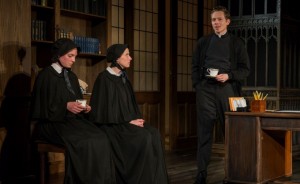 IN GLENCOE, ILL.:
IN GLENCOE, ILL.:
• Doubt (drama, PG-13, closes Aug. 2, reviewed here)
CLOSING SATURDAY IN BOSTON:
• Light Up the Sky (comedy, G, not suitable for small children, reviewed here)
CLOSING SUNDAY IN CHICAGO:
• Sense and Sensibility (musical, G, reviewed here)
CLOSING SUNDAY ON BROADWAY:
• The Visit (serious musical, PG-13, far too dark and disturbing for children, reviewed here)



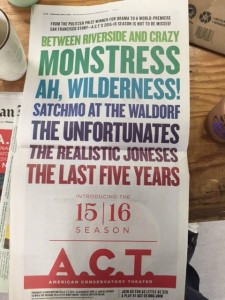 • If you visit this blog with even modest regularity, you know that the next stop for Satchmo at the Waldorf is San Francisco’s
• If you visit this blog with even modest regularity, you know that the next stop for Satchmo at the Waldorf is San Francisco’s 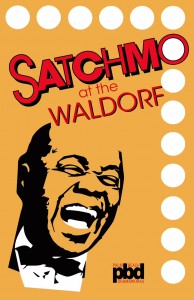 Later that same day, the South Florida Sun-Sentinel ran a story about
Later that same day, the South Florida Sun-Sentinel ran a story about  • I know not how or why, but
• I know not how or why, but 
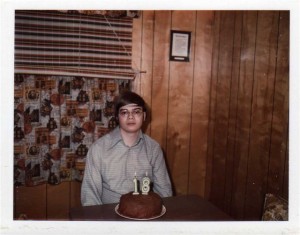 That move was the great divide of my life, far greater and more consequential than my departure from Smalltown, U.S.A., in the fall of 1974. After an unhappy and abortive semester at St. John’s College in Annapolis, I transferred to William Jewell College, a school not far from Kansas City, where I felt completely at home. Many of the friendships that I forged in Kansas City remained alive when I moved from there to Urbana, Illinois, in 1983. But once I left the Midwest for good two years later, I left my friends behind, and my subsequent contacts with them would be sporadic at best.
That move was the great divide of my life, far greater and more consequential than my departure from Smalltown, U.S.A., in the fall of 1974. After an unhappy and abortive semester at St. John’s College in Annapolis, I transferred to William Jewell College, a school not far from Kansas City, where I felt completely at home. Many of the friendships that I forged in Kansas City remained alive when I moved from there to Urbana, Illinois, in 1983. But once I left the Midwest for good two years later, I left my friends behind, and my subsequent contacts with them would be sporadic at best.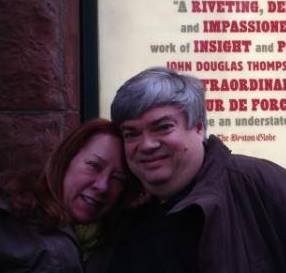 I’ve since gotten back in touch with several of the people whom I knew in high school and college, a process much facilitated by the coming of Facebook, and I’ve visited Kansas City several more times, always with the greatest of pleasure. I went so far as to take Mrs. T there in 2011. (She loved it.) Alas, my ties to the past continue to live mostly in memory. Not only do I know no one in New York who comes from Missouri, but I’ve made most of my present-day friends in the past decade and a half. Except for the members of my immediate family and Our Girl in Chicago, whom I met in 1988, there is only one person whom I now see other than occasionally whose friendship with me dates from my earliest years in New York, and none whom I knew prior to 1985.
I’ve since gotten back in touch with several of the people whom I knew in high school and college, a process much facilitated by the coming of Facebook, and I’ve visited Kansas City several more times, always with the greatest of pleasure. I went so far as to take Mrs. T there in 2011. (She loved it.) Alas, my ties to the past continue to live mostly in memory. Not only do I know no one in New York who comes from Missouri, but I’ve made most of my present-day friends in the past decade and a half. Except for the members of my immediate family and Our Girl in Chicago, whom I met in 1988, there is only one person whom I now see other than occasionally whose friendship with me dates from my earliest years in New York, and none whom I knew prior to 1985.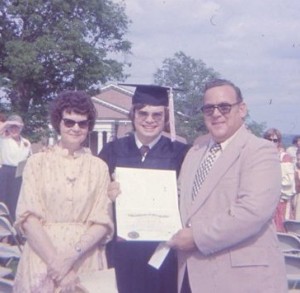 That’s why it meant so much to me to learn that a Friend of My Youth had seen Satchmo. In the days when Debbie and I knew one another well, I was still in the early stages of the slow process of becoming myself. Yes, I’d acted in a few plays—in fact, Debbie saw me on stage more than once, a thought that makes me cringe with retrospective embarrassment—but I had yet to start playing jazz professionally or write my first concert review or visit New York. If you’d told me back then that it was my destiny to move there, become a drama critic, and write a successful play of my own, I would have laughed in your face. My sense of possibilities had been cramped by my small-town upbringing, and the wonderful opening world of adulthood, with its infinitely wider horizons, had yet to fully open itself to me.
That’s why it meant so much to me to learn that a Friend of My Youth had seen Satchmo. In the days when Debbie and I knew one another well, I was still in the early stages of the slow process of becoming myself. Yes, I’d acted in a few plays—in fact, Debbie saw me on stage more than once, a thought that makes me cringe with retrospective embarrassment—but I had yet to start playing jazz professionally or write my first concert review or visit New York. If you’d told me back then that it was my destiny to move there, become a drama critic, and write a successful play of my own, I would have laughed in your face. My sense of possibilities had been cramped by my small-town upbringing, and the wonderful opening world of adulthood, with its infinitely wider horizons, had yet to fully open itself to me.